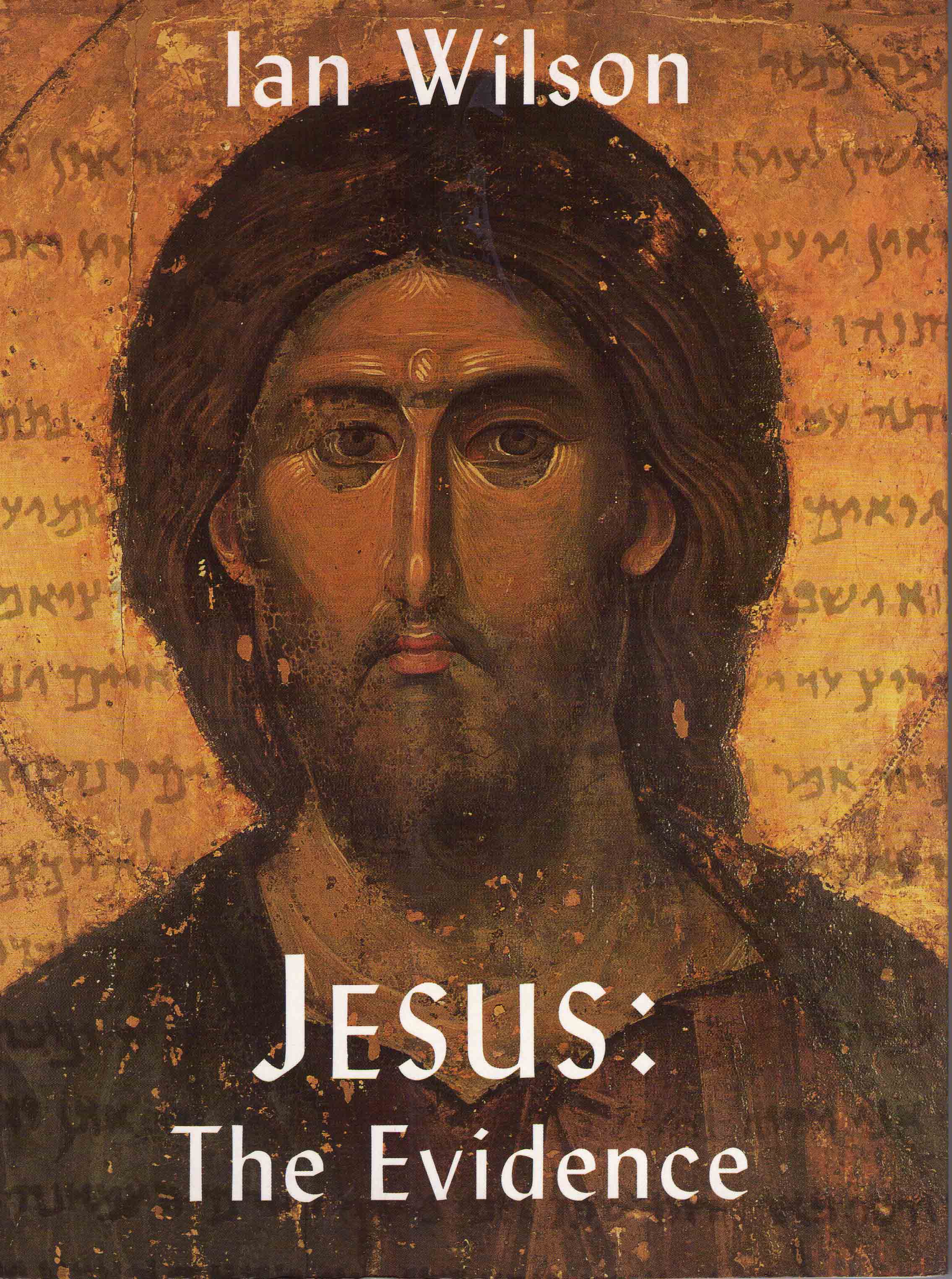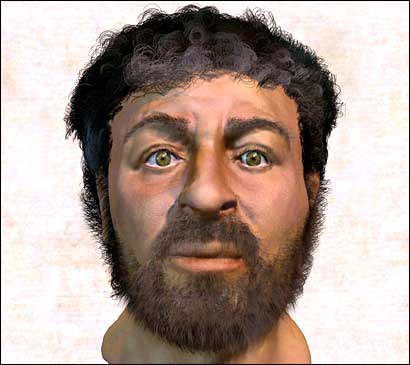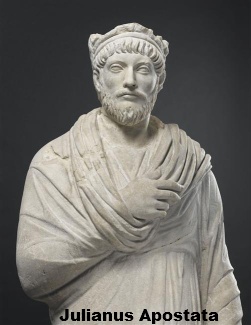This is Joseph Hoffmann’s response to the Jesus
Seminar & the quest of the historical Jesus:

Crouching somewhere between esthetic sound byte and historical detail is Michelangelo’s famous statement about sculpture. “The job of the sculptor,” Vasari attributes to il Divino,” is to set free the forms that are within the stone.” It’s a lovely thought—poetic, in fact. If you accept the theory of Renaissance Platonism, as Michelangelo embodies it, you also have to believe that “Moses” and “David” were encased in stone, yearning to be released—as the soul yearns to be set free from the flesh in the theology of salvation. You will however be left wondering why such a theory required human models with strong arms and firm thighs, and why the finished product bears no more resemblance to real or imagined historical figures than a drawing that any one of us could produce. We may lack Michelangelo’s skill and his deft way with a rasp and chisel, but we can easily imagine more probable first millennium BC heroes—in form, stature, skin-tone, and body type—than the Italian beauties he released from their marble prisons. In fact, the more we know about the second millennia BC, the more likely we are to be right. And alas, Michelangelo didn’t know very much about history at all. And what’s more, it made no difference to his art, his success, or to his reputation. That is why idealism and imagination are sometimes at odds with history, or put bluntly, why history acts as a control on our ability to imagine or idealize anything, often profoundly wrong things.
If we apply the same logic to the New Testament, we stumble over what I have (once or twice) called the Platonic Fallacy in Jesus research. Like it or not, the New Testament is still the primary artifact of the literature that permits us to understand the origins of Christianity. It’s the stone, if not the only stone. If we possessed only gnostic and apocryphal sources as documentary curiosities and no movement that preserved them, we would be hard-pressed to say anything other than that at some time in the first and second century a short-lived and highly incoherent religious movement fluoresced and faded (many did) in the night sky of Hellenistic antiquity. The Jesus we would know from these sources would be an odd co-mixture of insufferable infant a la the Infancy Gospel of Thomas, a hell-robber, like the liberator of the Gospel of Nicodemus, a mysterious cipher, like the unnamed hero of the Hymn of the Pearl, or an impenetrable guru, like the Jesus of the gnostic Gospel of Thomas. Despite the now-yellowed axiom we all learned as first year divinity students of a certain generation and later in graduate school (the one where we are taught that “no picture of early Christianity is complete without availing ourselves of all the sources”), I will climb out on a limb to say that these sources are not so much integral to a coherent picture of early Christianity as they are pebbles in orbit around the gravitational center we call the canon. They are interesting—fascinating even—in showing us how uniformity of opinion and belief can wriggle out of a chaos of alterative visions (maybe the closest analogues are in constitutional history), but they are not the stone that the most familiar form of Christianity was made from. That recognition is as important as it is increasingly irrelevant to modern New Testament discussion.
So, how do we approach the New Testament? What kind of rock is it? We know (to stay with the metaphor) that it’s “metamorphic”—made of bits and pieces formed under pressure—in the case of the New Testament, doctrinal and political pressure to define the difference between majority and minority views and impressions, once but now unfashionably called “orthodoxy” and “heresy.”
Whatever the root-causes of canon-formation, canon we have. The Platonic Fallacy comes into play when New Testament scholarship labors under assumptions that emanated from the literary praxis of Renaissance humanists and then (in methodized form) fueled the theological faculties of Germany well into the twentieth century (before a staggering retreat from “higher criticism” by neo-orthodox, and then existentialist, postmodern, and correctness theologians).
 The sequence of Jesus-quests that began before Schweitzer (who thought he was writing a retrospective!)—and the succession of theories they produced were honest in their understanding of the metamorphic nature of the canon and the textual complexity of the individual books that composed it. The legacy, at least a legacy of method, of the early quests was a healthy skepticism that sometimes spilled over into Hegelianism, as with F. C. Baur, or mischievous ingenuity, as with Bruno Bauer. But what Left and Right Hegelians and their successors—from Harnack to Bultmann to the most radical of their pupils—had in common was a strong disposition to approach the canon with a chisel, assuming that if the historical accretions, misrepresentations, and conscious embellishment could be stripped away, beneath it all lay the figure of a comprehensible Galilean prophet whose life and message could be used to understand the “essence” (the nineteenth-century buzzword) of Christianity.
The sequence of Jesus-quests that began before Schweitzer (who thought he was writing a retrospective!)—and the succession of theories they produced were honest in their understanding of the metamorphic nature of the canon and the textual complexity of the individual books that composed it. The legacy, at least a legacy of method, of the early quests was a healthy skepticism that sometimes spilled over into Hegelianism, as with F. C. Baur, or mischievous ingenuity, as with Bruno Bauer. But what Left and Right Hegelians and their successors—from Harnack to Bultmann to the most radical of their pupils—had in common was a strong disposition to approach the canon with a chisel, assuming that if the historical accretions, misrepresentations, and conscious embellishment could be stripped away, beneath it all lay the figure of a comprehensible Galilean prophet whose life and message could be used to understand the “essence” (the nineteenth-century buzzword) of Christianity.
Whether the program was demythologizing or structuralist exegesis, the methods seemed to chase forgone conclusions about what the Gospels were and what the protagonist must “really” have been like. Judged by the standards of the chisel-bearers of the Tübingen school, Schweitzer’s caution that the Jesus of history would remain a mystery (“He comes to us as one unknown…”) was both prophetic and merely an interlude in the effort to excavate the historical Jesus. If it was meant to be dissuasive, it was instead a battle cry for better chisels and more theorists. In the latter part of the twentieth century, it has involved a demand for more sources as well—not to mention cycles of translations, each purporting to be “definitive” and thus able to shed light on a historical puzzle that the previous translation did not touch or failed to express. Judas, Philip, and Mary Magdalene have achieved a star-status far out of proportion to anything they can tell us about the historical Jesus, let alone consideration of literary merit or influence on tradition. When I say this, I am not asking modern scholarship to embrace the opinions of “dead orthodox bishops” or “winners,” but to get behind the choices the church’s first intellectuals made and their reasons for making them. The politicization of sources, the uninformative vivisection of historically important theological disputes into a discussion of outcomes (winners, losers) may make great stuff for the Discovery channel or the Easter edition of Time, but it is shamelessly Hollywood and depends on a culture of like-minded footnotes and a troubling disingenuousness with regard to what scholars know to be true and what they claim to be true.
Moreover, it is one of the reasons (I’m loathe to say) why a hundred years after the heyday of the “Radical School” of New Testament scholarship—which certainly had its warts—the questions of “total spuriousness” (as of Paul’s letters) and the “non-historicity of Jesus” are still considered risible or taboo. They are taboo because of the working postulate that has dominated New Testament scholarship for two centuries and more: that conclusions depend on the uncovering of a kernel of truth at the center of a religious movement, a historical center, and, desirably, a historical person resembling, if not in every detail, the protagonist described in the Gospels. This working postulate is formed by scholars perfectly aware that no similar imperative exists to corroborate the existence (or sayings) of the “historical” Adam, the historical Abraham, or Moses, or David—or indeed the prophets—or any equivalent effort to explain the evolution of Judaism on the basis of such inquiry.
The Platonic Fallacy depends on the “true story” being revealed through the disaggregation of traditions: dismantle the canon, factor and multiply the sources of the Gospels, marginalize the orthodox settlement as one among dozens of possible outcomes affecting the growth of the church, incorporate all the materials the church fathers sent to the bin or caused to be hidden away. Now we’re getting somewhere. It shuns the possibility that the aggregation of traditions begins with something historical, but not with a historical individual—which even if it turns out to be false, is a real possibility. Even the most ardent historicists of the twentieth century anticipated a “revelation” available through historical research; thus Harnack could dismiss most of the miracles of the Gospels, argue for absolute freedom of inquiry in gospels-research (a theme Bultmann would take up), insist that “historical knowledge is necessary for every Christian and not just for the historian,” all however in order to winnow “the timeless nucleus of Christianity from its various time bound trappings.”
 The Jesus Seminar was perhaps the last gasp of the Platonic Fallacy in action. Formed to “get at” the authentic sayings of Jesus, it suffered from the conventional hammer and chisel approach to the sources that has characterized every similar venture since the nineteenth century, missing only the idealistic and theological motives for sweeping up afterward. It will remain famous primarily for its eccentricity, its claim to be a kind of Jesus-vetting jury and to establish through a consensus (never reached) what has evaded lonelier scholarship for centuries.
The Jesus Seminar was perhaps the last gasp of the Platonic Fallacy in action. Formed to “get at” the authentic sayings of Jesus, it suffered from the conventional hammer and chisel approach to the sources that has characterized every similar venture since the nineteenth century, missing only the idealistic and theological motives for sweeping up afterward. It will remain famous primarily for its eccentricity, its claim to be a kind of Jesus-vetting jury and to establish through a consensus (never reached) what has evaded lonelier scholarship for centuries.
The Seminar was happy with a miracle-free Jesus, a fictional resurrection, a Jesus whose sayings were as remarkable as “And how are you today, Mrs. Jones?” It used and disused standard forms of biblical criticism selectively and often inexplicably to offer readers a “Jesus they never knew,” a Galilean peasant, a cynic, a de-eschatologized prophet, a craftsman whose dad was a day-laborer in nearby Sepphoris (never mind the Nazareth issue, or the Joseph issue). These purportedly “historical” Jesuses were meant to be more plausible than the Jesus whose DNA lived on in the fantasies of Dan Brown and Nikos Kazantzakis. But, in fact, they began to blur. It betimes took sources too literally and not literally enough, and when it became clear that the star system it evoked was resulting in something like a Catherine Wheel rather than a conclusion, it changed the subject. As long ago as 1993, it became clear that the Jesus Seminar was yet another attempt to break open the tomb where once Jesus lay—I’m reminded of a student’s gospel paraphrase of Luke 24.5, with 24.42 [“They gave him a piece of cooked fish…”] in view—to find a note that read “Gone Fishing,” in Hebrew, Latin, and Greek. It was then that I commented in a popular journal that “The Jesus of the Westar Project is a talking doll with a questionable repertoire of thirty-one sayings. Pull a string and he blesses the poor.” I was anticipated in this by none other than John Dominic Crossan (a Seminar founder) who wrote in 1991, having produced his own minority opinion concerning Jesus, “It seems we can have as many Jesuses as there are exegetes… exhibiting a stunning diversity that is an academic embarrassment.” And Crossan’s caveat had been expressed more trenchantly a hundred years before by the German scholar Martin Kaehler: “The entire life of the Jesus movement,” he argued, was based on misperceptions “and is bound to end in a blind alley… Christian faith and the history of Jesus repel each other like oil and water.”
If we add these to the work of the Jesus Seminar, the “extra-Seminar Jesuses,” magicians, insurgents, bandits [the author is probably referring to the work of Morton Smith and Hyam Maccoby], we end up with a multiplicity that “makes the prospect that Jesus never existed a welcome relief.”
Bruce Chilton is one of a number of scholars who comes away from the Jesus Seminar sadder but wiser and hopes that the Jesus Project will not be another stuttering attempt to break rocks and piece them back together to create plausible Jesuses, as Michelangelo created a plausible Moses for the Italians of the sixteenth century. His challenge to the Project is fair enough. In fact, one of the benefits we inherit from the Seminar is a record of success and failure. It raised the question of methodology in a way that can no longer be ignored, without however providing a map for further study. Its legacy is primarily a cautionary tale concerning the limits of “doing” history collectively, and sometimes theologically, and the Jesus Project must take this seriously.
Let me add to this commentary a special concern as I watch the Project unfold. Jesus-research—biblical research in general—through the end of the twentieth century was exciting stuff. The death of one of the great Albright students last year, and a former boss of mine at the University of Michigan, David Noel Freedman, reminds us that we may be at the end of the road. Albright’s careful scholarship and research, and his general refusal to shy away from the “results” of archaeology, were accompanied by a certain optimism in terms of how archaeology could be used to “prove” the Bible. In its general outline, the Bible was true; there was no reason (for example) to doubt the essential biographical details of the story of Abraham in Genesis. Albright’s pupils were less confident of the biblical record as William Dever observed in a classic 1995 article in The Biblical Archaeologist. His central theses have all been overturned, partly by further advances in Biblical criticism, but mostly by the continuing archaeological research of younger Americans and Israelis to whom he himself gave encouragement and momentum. The irony is that, in the long run, it will have been the newer “secular” archaeology that contributed the most to Biblical studies, not “Biblical archaeology.” New Testament archaeology is a different house, built with different stones. To be perfectly fair, the biblical appendix lacks the geographical markers and vivid information that suffuse the Hebrew Bible. If the Old Testament landscape is real geography populated by mythical heroes, the New Testament trends in the opposite direction. For that reason, New Testament scholars in my opinion have tried to develop an ersatz- “archaeology of sources” to match the more impressive gains in Old Testament studies.
The reasons for the “new sources” trend in New Testament research are multiple, but the one I fear the most is Jesus-fatigue. There is a sense that prior to 1980 New Testament scholarship was stuck in the mire of post-Bultmannian ennui. Jesus Seminars and Jesus Projects have been in part a response to a particular historical situation. Five gospels are better than four. The more sources we have the more we know about Jesus. Source “Q” (a) did exist, (b) did not exist, or (c) is far more layered and interesting than used to be thought. Judas was actually the primary apostle. No, it was Mary Magdalene.
When we considered developing the Jesus Project, it was not out of any malignant attempt to “prove” that Jesus did not exist. (The press releases have done an immeasurable disservice by harping on this as the agenda). As a Christian origins scholar by training, I am not even sure how one would go about such a task, or be taken seriously if it were undertaken. Yet the possibility that Christianity arose from causes that have little to do with a historical founder is one among many other questions the Project should take seriously. Inevitably, scholars and critics (if not always the same people) will ask, And just how do you go about doing that?, and neither the answer “Differently” or “Better” will suffice. The demon crouching at the door, however, is not criticism of its intent nor skepticism about its outcome, but the sense that biblical scholarship in the twentieth century will not be greeted with the same excitement as it was in Albright’s day. Outside America, where the landscape is also changing, fewer people have any interest in the outcomes of biblical research, whether it involves Jericho or Jesus. The secularization of world culture, which will eventually reach even into the Muslim heartlands, encourages us to value what matters here and now. As one of our members, Arthur Droge (Toronto) mentioned at the recent meeting of the Project in Amherst, NY, most of us were trained in a generation “that believed certain questions were inherently interesting.” But fewer and fewer people do. Jesus-fatigue—the sort of despair that can only be compared to a police investigation gone cold—is the result of a certain resignation to the unimportance of historical conclusions.
Reaching for the stars and reaching back into history have in common the fact that their objects are distant and sometimes unimaginably hard to see. What I personally hope the Project will achieve is to eschew breaking rocks, and instead learning to train our lens in the right direction. Part of that process is to respond to Droge’s challenge: Why is this important? And I have the sense that in trying to answer that question, we will be answering bigger questions as well.









